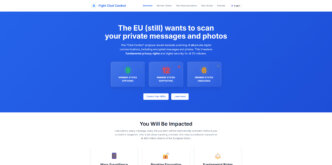Germany has withdrawn its support for the much-debated EU “Chat Control” regulation, delivering a serious blow to the bill’s momentum. Under mounting public pressure and criticism from technologists and civil society, Berlin’s decision may block the proposal from securing the required majority in the EU Council — at least for now.
The “Chat Control” plan, formally known as the Regulation to Prevent and Combat Child Sexual Abuse (CSAR), would require messaging apps and other digital services to scan private communications — including encrypted messages — for content related to child sexual abuse material (CSAM).
Critics argue the measure would undermine end-to-end encryption, weaken digital privacy, and create a de facto mass surveillance regime. Over 500 cryptographers and security experts recently issued an open letter warning that the proposal would introduce vulnerabilities exploitable by hackers, authoritarian regimes, or other malicious actors.
Supporters frame it as a necessary tool to protect children and curb illicit content online — though opponents say safer alternatives exist that don’t compromise privacy.
Until recently, Germany was among the “undecided” member states regarding Chat Control. But over the past weeks, Berlin has openly rejected aspects of the proposal that would weaken encryption.
In its public statements, Germany emphasized that it could not support any regulation that mandates breaking or weakening private communications. That opposition is critical: Germany’s population and weight in the Council make its vote pivotal to building a qualified majority for the regulation.
Why This Is a Victory — But Not the End of the Battle
A symbolic and tactical win:
The German move signals that public voices, expert criticism, and civil society organization efforts still matter. As Patrick Breyer, a digital rights advocate, noted, this moment shows protest can influence high-stakes policy.
But the threat remains alive:
The Chat Control draft is still on the table. The EU Council and Parliament could revive or amend it, attempting to find compromises that might satisfy enough states to pass it.
Proponents will likely push new versions, employing more subtle technical language or limiting certain scanning features. The fight now turns to the details, not just the headline.
Stakes for privacy are high:
If enforced, Chat Control would open the door to large-scale intrusion into private communications. The requirement of local (client-side) scanning and forced access to encrypted content is seen by many experts as inherently incompatible with secure, private systems.
Already, Tuta Mail — a German encrypted email provider — has pledged to sue if the regulation passes, rather than weaken its encryption.
What comes next:
- The EU Council is expected to hold critical votes in the coming period.
- Civil society and privacy groups will intensify efforts to hold governments accountable.
- Technical, legal, and procedural debates over encryption safeguards, oversight, and limits to scanning will dominate.
- The public will need to remain engaged — this issue is not over.
This German decision is a strong win for advocates of digital rights and privacy. But as Breyer cautioned, the larger battle continues. Legislators, civil rights groups, and citizens must remain vigilant to prevent weaker proposals from slipping through the cracks.







